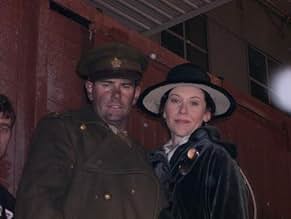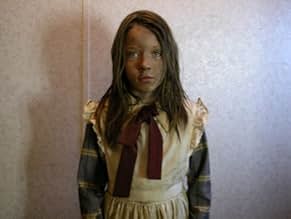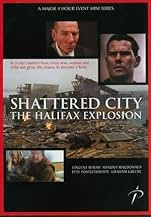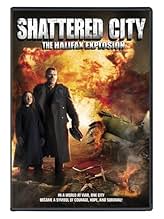A true story about the tragic explosion at Halifax Harbour, Canada, in the early hours of December 6, 1917.A true story about the tragic explosion at Halifax Harbour, Canada, in the early hours of December 6, 1917.A true story about the tragic explosion at Halifax Harbour, Canada, in the early hours of December 6, 1917.
- Awards
- 8 wins & 6 nominations total
Browse episodes
Featured reviews
I have to thank CBC, actually, for making this movie. Before a visit to Halifax on the QE2, I had never heard of the Explosion (typical American - although, in fact, I'm Canadian-born). But even seeing the great memorial didn't really register the extent of the disaster until I saw the movie. Yes, characters were combined or fictionalized in some cases, but that is absolutely secondary to the portrayal of that horrific episode in Canadian history. The effects of the blast were particularly well done. I hope it plays again, as indeed it should every couple of years or so, to remind us all of both the losses and the bravery incurred that day.
My commentary: First and foremost, while the emphasis was on human error in the movie, the fact is war is a very fertile breeding ground for accidents on top of the deliberate carnage. "Saving Private Ryan" noted this with the mention of the glider that was fitted with armor plating - but no one thought to tell the pilot. So it crashes and six soldiers are killed needlessly. Accounts of war proliferate in tragic incidents such as that one. The Halifax Explosion must be the biggest war-related accident in history.
The Great War featured incomprehensibly vast usage of artillery shells, and artillery shells need TNT and other explosives. A lot of this had to be imported from the U.S., and by ships. Ships had to be gathered in ports. Ports will then see a lot of ships coming and going, and harbor masters are going to be pressed to keep all this traffic moving. The odds were considerable something like the incident of Dec. 6th, 1917 would happen someplace in Allied ports sooner or later.
Captain Le Medec probably wasn't the greatest or bravest mariner of all time. But how many ship captains who have seniority or pull are going to agree to captain a massive floating bomb at the height of the U-boat menace? Second, did anyone notice that the movie exonerates harbor pilot Mackie while making Le Medec and the Belgian captain look like total dolts at the helm; and has Mackie trying to avert disaster while the Frenchman funks off with his crew? Considering it is a Canadian and not a French production, what a surprise.
Then there is the almost defeatist speech Capt. Collins gives to the war rally in the church. Excuse me, an *officer* in HM forces blurting out like that? It simply wouldn't have happened at the time. Contrary to what he later tells Barbara, Germans weren't close to suing for peace at the time, and the war wasn't kept going only because the Allies wanted another year of war profits. Indeed, with the Western Front stalemated and Russia close to surrender, Ludendorff et al were convinced victory for Germany was just around the corner. And a lot of people on the Allied side feared the same thing.
On the plus side, I was impressed by what the production did with a limited CBC budget.
The Great War featured incomprehensibly vast usage of artillery shells, and artillery shells need TNT and other explosives. A lot of this had to be imported from the U.S., and by ships. Ships had to be gathered in ports. Ports will then see a lot of ships coming and going, and harbor masters are going to be pressed to keep all this traffic moving. The odds were considerable something like the incident of Dec. 6th, 1917 would happen someplace in Allied ports sooner or later.
Captain Le Medec probably wasn't the greatest or bravest mariner of all time. But how many ship captains who have seniority or pull are going to agree to captain a massive floating bomb at the height of the U-boat menace? Second, did anyone notice that the movie exonerates harbor pilot Mackie while making Le Medec and the Belgian captain look like total dolts at the helm; and has Mackie trying to avert disaster while the Frenchman funks off with his crew? Considering it is a Canadian and not a French production, what a surprise.
Then there is the almost defeatist speech Capt. Collins gives to the war rally in the church. Excuse me, an *officer* in HM forces blurting out like that? It simply wouldn't have happened at the time. Contrary to what he later tells Barbara, Germans weren't close to suing for peace at the time, and the war wasn't kept going only because the Allies wanted another year of war profits. Indeed, with the Western Front stalemated and Russia close to surrender, Ludendorff et al were convinced victory for Germany was just around the corner. And a lot of people on the Allied side feared the same thing.
On the plus side, I was impressed by what the production did with a limited CBC budget.
Shattered City is a highly enjoyable retelling of an almost forgotten event in Canadian history. I am from Halifax, and for me, the sight of the ships exploding in the harbour was a visceral experience. The blast, which occurred in December, 1917, was the largest man-made explosion before Hiroshima, killed 2000 people instantly and vaporized two square miles of the city of Halifax.
I could have done without some of the more soap opera-like elements of it, but in all, I was engaged by the characters and moved by their horrendous plight. Although plagued by a low budget($10 million), the show did an excellent job of recreating wartime Halifax and the harbour, and the people felt authentic as they went about their daily lives.
This film is highly recommended for anyone who enjoys a good story of human courage and drama, and is a must-see for any fan of Canadian history.
Postscript: I now live in northern Canada, and watched the show with a group of westerners and northerners. None of them had heard of the Halifax Explosion. What a sad commentary on our woefully provincial education systems and on our ability to tell our own stories.
I could have done without some of the more soap opera-like elements of it, but in all, I was engaged by the characters and moved by their horrendous plight. Although plagued by a low budget($10 million), the show did an excellent job of recreating wartime Halifax and the harbour, and the people felt authentic as they went about their daily lives.
This film is highly recommended for anyone who enjoys a good story of human courage and drama, and is a must-see for any fan of Canadian history.
Postscript: I now live in northern Canada, and watched the show with a group of westerners and northerners. None of them had heard of the Halifax Explosion. What a sad commentary on our woefully provincial education systems and on our ability to tell our own stories.
It was nice to see another good movie about the Maritimes. There were certain things that lacked or needed more explanation, but on the whole it was an enjoyable movie based on true events. Most people have never even heard of the Halifax explosion; so, this movie should provide some info. The actors did a good job portraying their characters. It was wonderful to see Zachary Bennett (Ernest) again, whom most would remember as Felix King in the "Road to Avonlea" series. Unfortunately his character only appears in the first part and we never hear of him after that. This is a good movie to sit back in the evening and enjoy.
I really liked Vincent Walsh as the lead. He was very convincing in both the family-oriented scenes and the action stuff. The impending tragedy and the mundane actions that led to it were well-played and very gripping. It was nice to see a number of veteran Canadian actors like Lynne Griffin and Graham Green in large and small roles. I also thought the subplot about German saboteurs was both nicely diverting and added to the suspense. While Canadian productions can never hope to compete with Hollywood for budget and special effects, they can provide a Canadian "feel" to a project and "Shattered City" does that very well.
Did you know
- Trivia1,951 people were killed
- GoofsThere is a scene at the railway station in which a rail car carries the old CNR logo (A maple leaf with a box inside it containing the words "Canadian National Railways"). The CNR was formed in 1923.
- Crazy creditsThis film is dedicated to the spirit and the memory of Constance "Connie" Bond Young August 9, 1911 - February 22, 2003
- ConnectionsFollowed by City of Ruins: The Halifax Explosion (2003)
Details
- Release date
- Country of origin
- Official site
- Language
- Also known as
- La explosión de Halifax
- Filming locations
- Production companies
- See more company credits at IMDbPro
- Runtime
- 2h 55m(175 min)
- Color
- Sound mix
- Aspect ratio
- 1.78 : 1
Contribute to this page
Suggest an edit or add missing content































